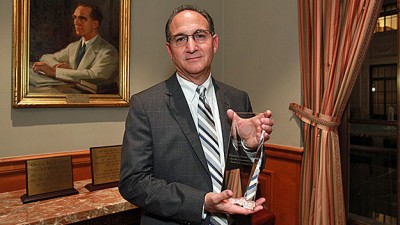
My good friend, Miami-Dade Judge Steve Leifman, received one of the highest honors awarded to a jurist during a recent ceremony held at the U.S. Supreme Court. I was privileged to be his guest and sit with his family when he received the William H. Rehnquist Award for Judicial Excellence from U.S. Chief Justice John Roberts. The award recognizes a judge each year who exemplifies judicial excellence, integrity, fairness, and professional ethics.
Judge Leifman was honored by his peers because of his tireless efforts to improve the lives of Americans with severe mental illnesses. True to form, he made an impassioned plea to his fellow judges during his acceptance speech, asking them to join him in diverting persons with mental disorders out of the criminal justice system and into community treatment.
If you have read my book, CRAZY: A Father’s Search Through America’s Mental Health Madness, you will recall that it was Judge Leifman who arranged for me to spend ten months inside the Miami-Dade detention center following persons with severe mental illnesses through the criminal justice system out onto the streets. I had not planned on doing research in Miami, but the Los Angeles jail kicked me out after two days, claiming that I was violating HIPAA. (That was simply an excuse to keep me from documenting the dreadful conditions I was seeing there.) I tried to visit jails in Chicago, New York, Baltimore and Washington D.C. but none of them would allow me access. I would not have been able to write my book had it not been for Judge Leifman who invited me to Miami.
After my book was published, Judge Leifman got a local CBS investigative reporter access to the jail to document horrific conditions inside the “Forgotten Floor” cellblocks where men with severe mental disorders were being held in what the jail’s own psychiatrist called “medieval conditions.” Judge Leifman brought community leaders together to begin improving services and convinced voters to pass a multi-million dollar bond issue to build a crisis assessment center outside the jail. Not satisfied, he took his campaign for mental health reforms first throughout the entire state of Florida by creating Florida Partners In Crisis, and then moved on nationally. He has testified before Congress and spoken to judges and psychiatrists at national conferences. The Chinese government invited him to Beijing to advise it about mental health laws and programs.
In his acceptance speech, Judge Leifman recalled how he had become frustrated when a defendant appeared in his courtroom clearly needing help. Ironically, the defendant was a psychiatrist who had once been in charge of the psychiatric department in one of Miami’s largest hospitals before he had developed paranoid schizophrenia. Upset by his inability to help the defendant, Leifman formed the 11th Judicial Circuit Criminal Mental Health Project, which diverts people with serious mental illnesses, who do not pose significant public safety risks, into community-based treatment and support programs.
His program has become one of the most successful in the nation and rivals the Bexar County, Texas diversion model that is currently the gold standard in getting sick people out of jail and into community treatment. The recidivism rate for people who successfully complete Leifman’s program after being charged with a felony is only 6 percent compared to a 86% recidivism rate nationally for persons with SMI (severe mental illnesses.) Some 4,000 people with mental illnesses have been diverted from the Miami-Dade County Jail.
Judge Leifman helped launch the nation’s largest Crisis Intervention Team training program too. More than 4,400 law enforcement officers in Miami-Dade County have been trained to recognize the signs and symptoms of mental illnesses and to respond more effectively and appropriately to people in psychiatric crisis. In the last four years, officers with Miami-Dade County and the city of Miami who have been trained in the C.I.T. program have responded to approximately 35,000 calls. Nearly 8,000 people were diverted into community treatment rather than being arrested. Just 85 arrests were made.
This is a major change from 2004 when I did my research in Miami and reported that six individuals with mental illnesses were fatally shot in a single year by Miami Dade officers.
Judge Leifman elected to become a champion for mental health reform even though he does not have anyone in his immediate family with an illness and despite the unpopularity of mental health causes. He is an example of the extra-ordinary power of a single individual to bring about meaningful changes.
His courage and leadership enabled me to become an advocate and his leadership has improved the lives of countless individuals with mental disorders and their families.
Thank you Judge Leifman for being a national leader and humanitarian. And congratulations!



